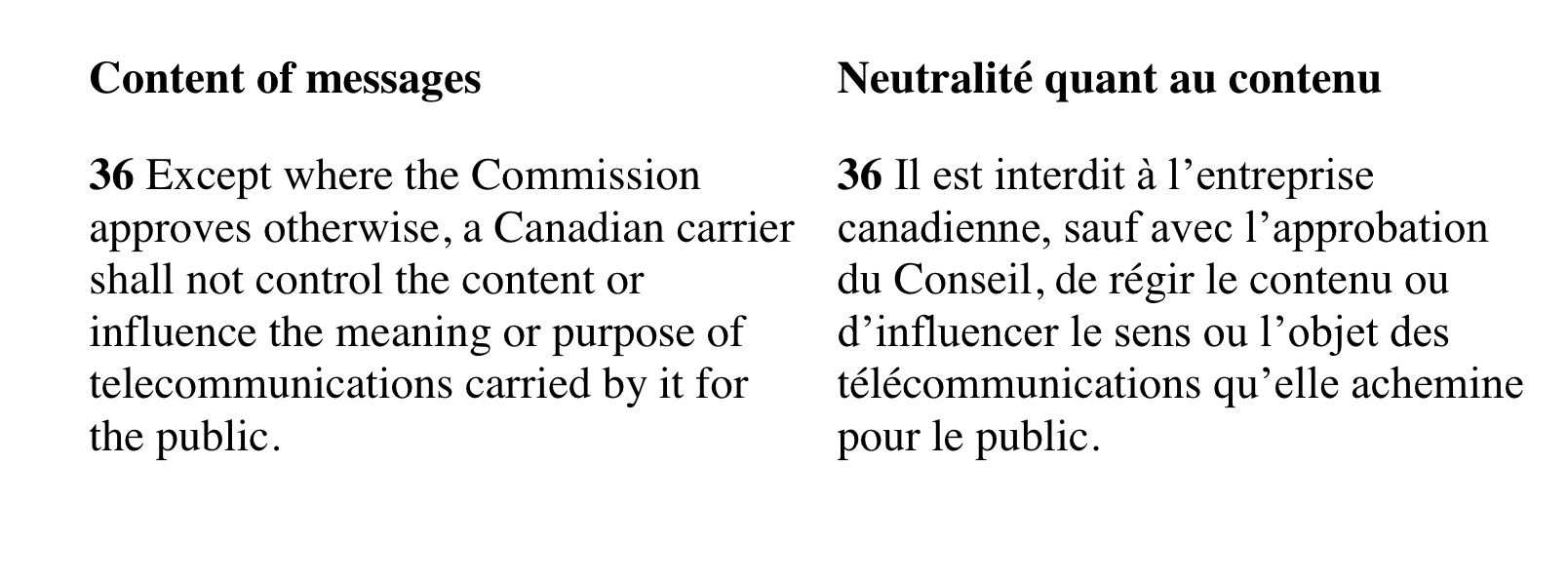
Today the Federal Court of Appeal issued its ruling in the GoldTV case. For those not familiar with the GoldTV case, it was a federal court case brought forward by Bell, Rogers, and Videotron against an IPTV provider known as GoldTV. The result was that in November 2019 the Federal Court sided with the applicants and issued the first ever injunction to have the websites and IPs used by GoldTV blocked by large residential ISPs. This was a major change for the ISP industry - for the first time ever they were now responsible for the content traversing their network, breaking the common carrier principal. As a result of the implications of this, Teksavvy and other parties appealed the decision.
This case had a lot of issues at play - as undesirable as a service like GoldTV is, are IP blocks and hijacking DNS queries the right way to solve this? And could ISPs even block this content if they wanted to? Section 36 of the Telecommunications Act (pictured below) limits the ability of carriers to control the content of messages carried over their networks without prior Commission authorization.

So on the surface, it looks like ISPs can't block websites as doing so would "influence" the telecommunications be carried by the ISP and therefore be in violation of Section 36. This view was reenforced in 2016 when Quebec attempted to block online gambling sites. In response to the Quebec bill, the CRTC issued a letter in which they stated
"Consistent with the above, the Commission is of the preliminary view that the Act prohibits the blocking by Canadian carriers of access by end-users to specific websites on the Internet, whether or not this blocking is the result of an ITMP. Consequently, any such blocking is unlawful without prior Commission approval, which would only be given where it would further the telecommunications policy objectives. Accordingly, compliance with other legal or juridical requirements—whether municipal, provincial, or foreign—does not in and of itself justify the blocking of specific websites by Canadian carriers, in the absence of Commission approval under the Act."
In the GoldTV case, the applicants (Bell,Rogers, Videotron) argued that Section 36 exists to ensure that ISPs and other common carriers remain neutral, prohibiting them from unilaterally controlling the content they carry, for example for commercial, anti-competitive, or policy purposes. Then then went on to argue that:
The present case does not involve a common carrier unilaterally controlling or influencing the content it carries at its own discretion, for example in order to provide itself with an undue advantage over competitors or to disadvantage legitimate communicators. Rather, it involves the Court concluding that a communication is illegal on a strong and uncontested prima facie basis and, as a result, enjoining common carriers to block access to that content.
Fast forward to today and the decision rendered by the court. In the decision, the Judge agreed with this amazing leap of logic to basically side-step Section 36 of the Telecom act:
I agree with the plaintiffs’ argument that complying with a Court-ordered injunction does not amount to controlling or influencing.On the contrary, it is the ISP that is being controlled or influenced by the Order.
First off, the order didn't enjoin all common carriers to block access to the content as argued by the plaintiffs, it only enjoined specific large residential ISPs, not all ISPs, and as such, could be argued that it actually gives an undue advantage to ISPs not listed as third party respondents to the action since they don't have to participate.
Further, the Telecom Act doesn't define what is a "legitimate communicator" - in the world of ISPs, a packet is a packet, and all packets should be treated equally. This is the bedrock principal of net neutrality and the basis of Section 36. ISPs have no role in being the arbiters of what is and what is not a legitimate communicator.
If you take the logic of this decision to the nth degree it means nothing can be a breach of Section 36 as long as the ISP is ordered to do it. With this decision, anyone can now ask for an ISP to block anything, and the protections previously granted by Section 36 don't apply. The flood gates are open - media companies and other interested parties are going to have a field day using this decision to make an end run around Section 36. RIP Section 36 - you will be sorely missed.
Comments